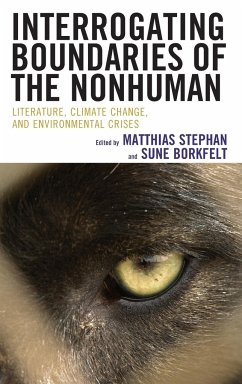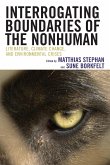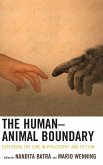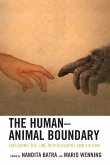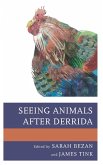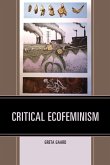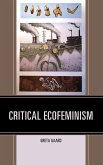Interrogating Boundaries of the Nonhuman
Literature, Climate Change, and Environmental Crises
Herausgeber: Stephan, Matthias; Borkfelt, Sune
Interrogating Boundaries of the Nonhuman
Literature, Climate Change, and Environmental Crises
Herausgeber: Stephan, Matthias; Borkfelt, Sune
- Gebundenes Buch
- Merkliste
- Auf die Merkliste
- Bewerten Bewerten
- Teilen
- Produkt teilen
- Produkterinnerung
- Produkterinnerung
This collection asks whether literary works that interrogate and alter the terms of human-nonhuman relations can point to new, more sustainable ways forward.
Andere Kunden interessierten sich auch für
![Interrogating Boundaries of the Nonhuman Interrogating Boundaries of the Nonhuman]() Interrogating Boundaries of the Nonhuman47,99 €
Interrogating Boundaries of the Nonhuman47,99 €![The Human-Animal Boundary The Human-Animal Boundary]() The Human-Animal Boundary117,99 €
The Human-Animal Boundary117,99 €![The Human-Animal Boundary The Human-Animal Boundary]() The Human-Animal Boundary50,99 €
The Human-Animal Boundary50,99 €![Ecocriticism of the Global South Ecocriticism of the Global South]() Ecocriticism of the Global South142,99 €
Ecocriticism of the Global South142,99 €![Seeing Animals after Derrida Seeing Animals after Derrida]() Seeing Animals after Derrida128,99 €
Seeing Animals after Derrida128,99 €![Critical Ecofeminism Critical Ecofeminism]() Greta GaardCritical Ecofeminism54,99 €
Greta GaardCritical Ecofeminism54,99 €![Critical Ecofeminism Critical Ecofeminism]() Greta GaardCritical Ecofeminism128,99 €
Greta GaardCritical Ecofeminism128,99 €-
-
-
This collection asks whether literary works that interrogate and alter the terms of human-nonhuman relations can point to new, more sustainable ways forward.
Produktdetails
- Produktdetails
- Verlag: Lexington Books
- Seitenzahl: 284
- Erscheinungstermin: 23. Mai 2022
- Englisch
- Abmessung: 235mm x 157mm x 21mm
- Gewicht: 615g
- ISBN-13: 9781666903768
- ISBN-10: 1666903760
- Artikelnr.: 63594362
- Herstellerkennzeichnung
- Libri GmbH
- Europaallee 1
- 36244 Bad Hersfeld
- gpsr@libri.de
- Verlag: Lexington Books
- Seitenzahl: 284
- Erscheinungstermin: 23. Mai 2022
- Englisch
- Abmessung: 235mm x 157mm x 21mm
- Gewicht: 615g
- ISBN-13: 9781666903768
- ISBN-10: 1666903760
- Artikelnr.: 63594362
- Herstellerkennzeichnung
- Libri GmbH
- Europaallee 1
- 36244 Bad Hersfeld
- gpsr@libri.de
Edited by Matthias Stephan and Sune Borkfelt - Contributions by Clare Archer-Lean; Sune Borkfelt; Anastasia Cardone; Kristen R. Egan; Owen Harry; Samantha Hind; Lauren O'Mahony; Lauren E. Perry-Rummel; Matthias Stephan; Adrian Tait; Elizabeth Tavella; Mar
Part I: Past Narratives of Environmental Crisis
Chapter 1: The Peculiar Associations of Melville's "Encantadas": Nature and
National Allegory
Kristen R. Egan
Chapter 2: Making a Difference? Richard Jefferies' After London, E. M.
Forster's "The Machine Stops," and Climate Change Fiction
Adrian Tait
Chapter 3: Stories of "Being-with" Other Animals: A Case of Humans and
Horses
Mary Trachsel
Part II: Witnessing
Chapter 4: Animal Texts: How Coyote America and American Wolf Embody the
Literary Animal Through A Cross-Disciplinary Approach
Lauren E. Perry
Chapter 5: Beautiful and Sublime: Embracing Otherness in Mary Oliver's
Ecopoetry
Anastasia Cardone
Chapter 6: The Sea's Witness: Narration, Texturisation and Reader
Responsibility in Rachel Carson's Oceanalia
Lauren O'Mahony
Part 3: Nonhuman Agency/Representation of the Nonhuman
Chapter 7: The Posthuman Return: Transformation through Stillness in
Richard Powers's The Overstory
Owen Harry
Chapter 8: Classifying Monsters
Vera Veldhuizen
Chapter 9: "'There isn't Anything that isn't Political.' It's an Expression
that Sounds Human, but Everything in Her Voice Indicates that She is Not':
The Nonhuman Subject as Decolonising Trope in Ellen Van Neervan's 'Water'"
(2014)
Clare Archer-Lean
Part IV: Mutation and Post-Apocalypse
Chapter 10: "We've Made Meat for Everyone!:" The Ideology of Distinction
and Becoming Flesh in Cormac McCarthy's The Road and Joseph D'Lacey's Meat
Samantha Hind
Chapter 11: "There would be monsters, some hopeful": Viral Agencies and
Mutational Posthuman Politics in Post-Millennial Science Fiction
Clare Wall
Chapter 12: "A Reign of Community and Harmony": Envisioning a Multispecies
Society in a Post-Nuclear World
Elizabeth Tavella:
Chapter 1: The Peculiar Associations of Melville's "Encantadas": Nature and
National Allegory
Kristen R. Egan
Chapter 2: Making a Difference? Richard Jefferies' After London, E. M.
Forster's "The Machine Stops," and Climate Change Fiction
Adrian Tait
Chapter 3: Stories of "Being-with" Other Animals: A Case of Humans and
Horses
Mary Trachsel
Part II: Witnessing
Chapter 4: Animal Texts: How Coyote America and American Wolf Embody the
Literary Animal Through A Cross-Disciplinary Approach
Lauren E. Perry
Chapter 5: Beautiful and Sublime: Embracing Otherness in Mary Oliver's
Ecopoetry
Anastasia Cardone
Chapter 6: The Sea's Witness: Narration, Texturisation and Reader
Responsibility in Rachel Carson's Oceanalia
Lauren O'Mahony
Part 3: Nonhuman Agency/Representation of the Nonhuman
Chapter 7: The Posthuman Return: Transformation through Stillness in
Richard Powers's The Overstory
Owen Harry
Chapter 8: Classifying Monsters
Vera Veldhuizen
Chapter 9: "'There isn't Anything that isn't Political.' It's an Expression
that Sounds Human, but Everything in Her Voice Indicates that She is Not':
The Nonhuman Subject as Decolonising Trope in Ellen Van Neervan's 'Water'"
(2014)
Clare Archer-Lean
Part IV: Mutation and Post-Apocalypse
Chapter 10: "We've Made Meat for Everyone!:" The Ideology of Distinction
and Becoming Flesh in Cormac McCarthy's The Road and Joseph D'Lacey's Meat
Samantha Hind
Chapter 11: "There would be monsters, some hopeful": Viral Agencies and
Mutational Posthuman Politics in Post-Millennial Science Fiction
Clare Wall
Chapter 12: "A Reign of Community and Harmony": Envisioning a Multispecies
Society in a Post-Nuclear World
Elizabeth Tavella:
Part I: Past Narratives of Environmental Crisis
Chapter 1: The Peculiar Associations of Melville's "Encantadas": Nature and
National Allegory
Kristen R. Egan
Chapter 2: Making a Difference? Richard Jefferies' After London, E. M.
Forster's "The Machine Stops," and Climate Change Fiction
Adrian Tait
Chapter 3: Stories of "Being-with" Other Animals: A Case of Humans and
Horses
Mary Trachsel
Part II: Witnessing
Chapter 4: Animal Texts: How Coyote America and American Wolf Embody the
Literary Animal Through A Cross-Disciplinary Approach
Lauren E. Perry
Chapter 5: Beautiful and Sublime: Embracing Otherness in Mary Oliver's
Ecopoetry
Anastasia Cardone
Chapter 6: The Sea's Witness: Narration, Texturisation and Reader
Responsibility in Rachel Carson's Oceanalia
Lauren O'Mahony
Part 3: Nonhuman Agency/Representation of the Nonhuman
Chapter 7: The Posthuman Return: Transformation through Stillness in
Richard Powers's The Overstory
Owen Harry
Chapter 8: Classifying Monsters
Vera Veldhuizen
Chapter 9: "'There isn't Anything that isn't Political.' It's an Expression
that Sounds Human, but Everything in Her Voice Indicates that She is Not':
The Nonhuman Subject as Decolonising Trope in Ellen Van Neervan's 'Water'"
(2014)
Clare Archer-Lean
Part IV: Mutation and Post-Apocalypse
Chapter 10: "We've Made Meat for Everyone!:" The Ideology of Distinction
and Becoming Flesh in Cormac McCarthy's The Road and Joseph D'Lacey's Meat
Samantha Hind
Chapter 11: "There would be monsters, some hopeful": Viral Agencies and
Mutational Posthuman Politics in Post-Millennial Science Fiction
Clare Wall
Chapter 12: "A Reign of Community and Harmony": Envisioning a Multispecies
Society in a Post-Nuclear World
Elizabeth Tavella:
Chapter 1: The Peculiar Associations of Melville's "Encantadas": Nature and
National Allegory
Kristen R. Egan
Chapter 2: Making a Difference? Richard Jefferies' After London, E. M.
Forster's "The Machine Stops," and Climate Change Fiction
Adrian Tait
Chapter 3: Stories of "Being-with" Other Animals: A Case of Humans and
Horses
Mary Trachsel
Part II: Witnessing
Chapter 4: Animal Texts: How Coyote America and American Wolf Embody the
Literary Animal Through A Cross-Disciplinary Approach
Lauren E. Perry
Chapter 5: Beautiful and Sublime: Embracing Otherness in Mary Oliver's
Ecopoetry
Anastasia Cardone
Chapter 6: The Sea's Witness: Narration, Texturisation and Reader
Responsibility in Rachel Carson's Oceanalia
Lauren O'Mahony
Part 3: Nonhuman Agency/Representation of the Nonhuman
Chapter 7: The Posthuman Return: Transformation through Stillness in
Richard Powers's The Overstory
Owen Harry
Chapter 8: Classifying Monsters
Vera Veldhuizen
Chapter 9: "'There isn't Anything that isn't Political.' It's an Expression
that Sounds Human, but Everything in Her Voice Indicates that She is Not':
The Nonhuman Subject as Decolonising Trope in Ellen Van Neervan's 'Water'"
(2014)
Clare Archer-Lean
Part IV: Mutation and Post-Apocalypse
Chapter 10: "We've Made Meat for Everyone!:" The Ideology of Distinction
and Becoming Flesh in Cormac McCarthy's The Road and Joseph D'Lacey's Meat
Samantha Hind
Chapter 11: "There would be monsters, some hopeful": Viral Agencies and
Mutational Posthuman Politics in Post-Millennial Science Fiction
Clare Wall
Chapter 12: "A Reign of Community and Harmony": Envisioning a Multispecies
Society in a Post-Nuclear World
Elizabeth Tavella:

